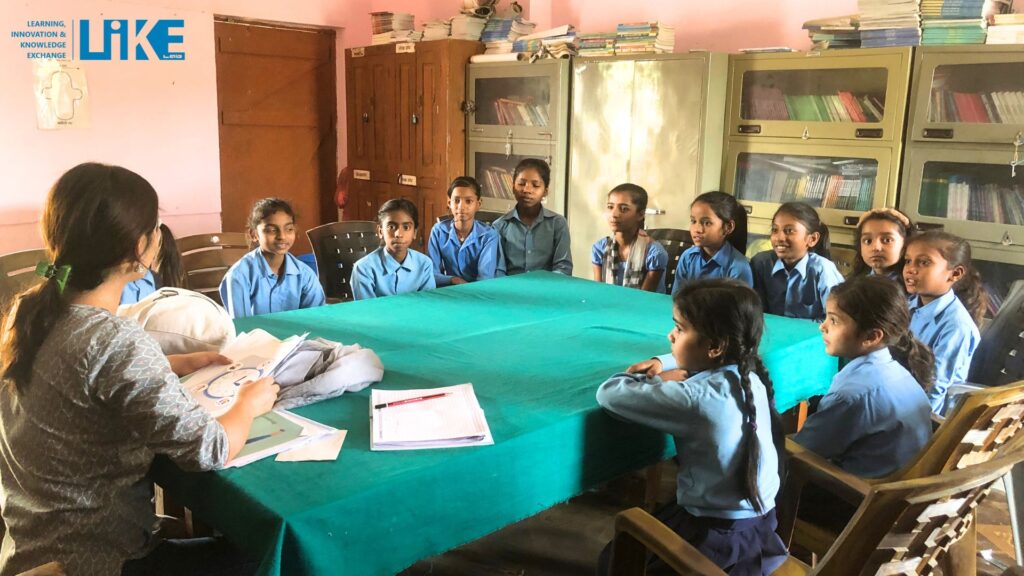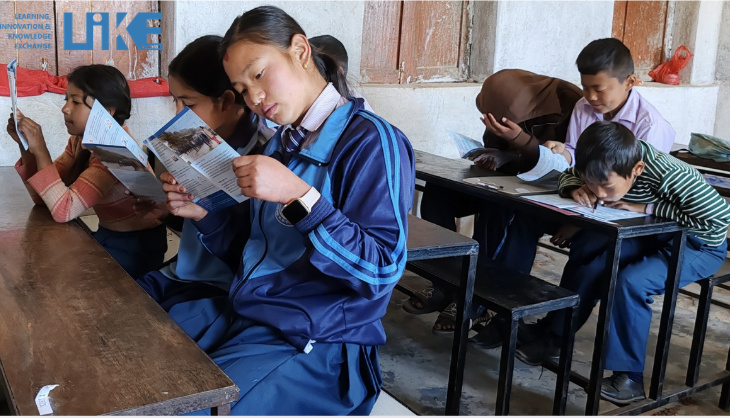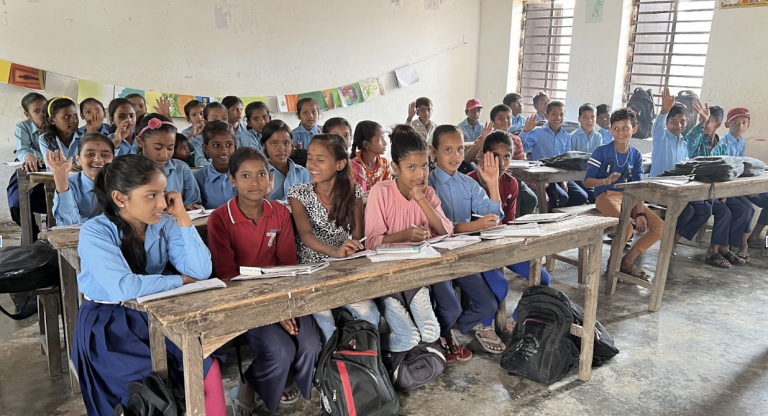Author: Isha Karki
We embarked on a field expedition to the Rautahat district on May 9th 2023 in order to develop a comprehensive understanding of the capabilities and functioning of children in public schools. The chosen research location consisted of two rural municipalities, Durgabhagwati Rural Municipality and Yamuna Mai Rural Municipality, and one urban municipality, Rajdevi Municipality. During the field visit, we facilitated 16 focused group discussions with students from grades 3 to 8, which included a total of 200 participants. Among them, there were 102 girls and 98 boys who took part in the discussions. It was a part of the research project “Effectiveness and Scalability of Programs for Children Who Are Out of School and at Risk of Dropping Out in Bangladesh, Bhutan, and Nepal,” supported by Global Partner for Education Knowledge & Innovation Exchange (GPEKIX) and International Development Research Center (IDRC). The purpose of the focus group discussions was to examine into the students’ interpretations and comprehension of 19 lists of capabilities and how these capabilities contribute to their overall functioning. The capability approach was introduced by Amartya Sen in the 1980s and focuses on evaluating human well-being and development based on the freedoms and opportunities individuals have to lead lives they value.
The capability approach encompasses various lists of capabilities put forth by different philosophers and intellectuals. Among these, respect holds significant importance as it recognizes the inherent value and agency of individuals, thus helping in the development and exercise of their capabilities. Respect plays a vital role in fostering positive relationships, promoting social harmony, and establishing an inclusive and affirming environment. The presence of a comfortable and respectful atmosphere is of utmost importance, particularly in an educational setting where students learn, grow, and spend a significant portion of their time.
What could respect mean to children? During the focus group discussion, we showed them a picture that conveyed the concept of respect and asked the participants to reflect on its meaning and share their insights. We explored the perceptions and experiences of students concerning respect in their interpersonal relationships, aiming to gain valuable insights into the dynamics that shape their interactions with peers, parents, and teachers. By understanding how students perceive respect, we can better comprehend its impact on their functioning. Students perceive respect as a concept, encompassing gestures like greeting others with “Namaste” and obeying parents and teachers. Most of the students said they hold deep respect for their teachers, parents, elders, and other seniors, recognizing the significance of respect in building positive relationships and fostering well-being.

Activities such as greeting teachers daily, assisting parents, touching seniors’ feet, listening to their parents advice, and helping their friends when needed are a few of the respective actions they have been practicing on a daily basis. One of the statements made by a female student during the focus group discussion was, “Not all teachers treat us with respect or love. Some teachers are truly respectful, while others scold, mock, or insult us, which leads to feelings of anger and sadness. As a result, we lose interest in attending classes taught by such teachers.” This implies that how teachers treat their students, particularly with respect and love, has a substantial impact on their attitudes and participation in their academic endeavors.
Students are more likely to feel motivated and interested in their lessons when they perceive teachers as respectful and caring. On the other hand, negative experiences involving disrespect, scolding, mockery, or insults can have detrimental effects on students emotional well-being and motivation to participate fully in the learning process. One of the male students in the discussion stated, “Female teachers respect us more than male teachers”. This statement infers that male students perceive a difference in the level of respect they receive from female teachers compared to male teachers. They believe that female teachers show them greater respect in their interactions. It also emphasizes the significance of identifying and addressing any potential disparities in the way teachers of different genders interact with and treat students, as this can impact students’ experiences, engagement, and overall academic performance.
Most of the students believed that the ultimate definition of respect involves showing respect to one’s parents and teachers. When asked if they receive respect in return, most of the students expressed that seniors are expected to show love rather than explicitly express respect. Teachers and parents reciprocated respect by showing love, imparting knowledge, bestowing blessings, and providing support when needed. According to them, respect is something that should be shown to elders, but younger ones should only be loved. What is the ideal meaning of respect? When we hear the word respect, does it imply we should only respect seniors? The ideal definition of respect should embrace the idea that everyone has inherent worth, dignity, and rights regardless of their age, social standing, or position. Although it is frequently emphasized in our culture that the elderly should be respected, this is not the primary goal or prerequisite for exhibiting respect. Students are generally taught in schools to respect elders and listen to their instructions, but it is imperative to highlight that respect should transcend age-based relationships. Students should be taught that respect should be displayed in all relationships, whether they involve classmates, seniors, juniors, or themselves.
Respect plays a vital role in fostering nurturing teacher-student relationships and sustaining productive interactions among students (Down et al., 2006; Held, 2006; Burton & Dunn, 1996). Teachers have a significant impact on fostering respectful environments and promoting positive relationships with students. They play a pivotal role by exhibiting respectful behavior, creating inclusive and supportive classroom environments, and valuing the perspectives and voices of students. Such respectful relationships between teachers and students establish the foundation for meaningful participation and active learning in the classroom. According to Zehm and Kotter (1993), Thompson (1998), and Marzano (2003), when students perceive that they are respected by their teachers, it positively impacts the quality of teacher-student relationships. In other words, teachers can create a safe and supportive learning environment by exhibiting respect, empathy, and active listening; this supportive environment nurtures students’ self-esteem and confidence. More importantly, students are more likely to be motivated, interested, and willing to explore their capabilities.
Respect fosters a harmonious and inclusive school environment, and it is essential for parents, teachers, and society as a whole to appreciate the importance of respect in cultivating strong interpersonal connections. The insights gained from students’ perceptions and experiences have indicated respect as a fundamental element within the capability approach, as it upholds human dignity, cultivates individual agency and autonomy, embraces diversity, and encourages inclusive participation.



